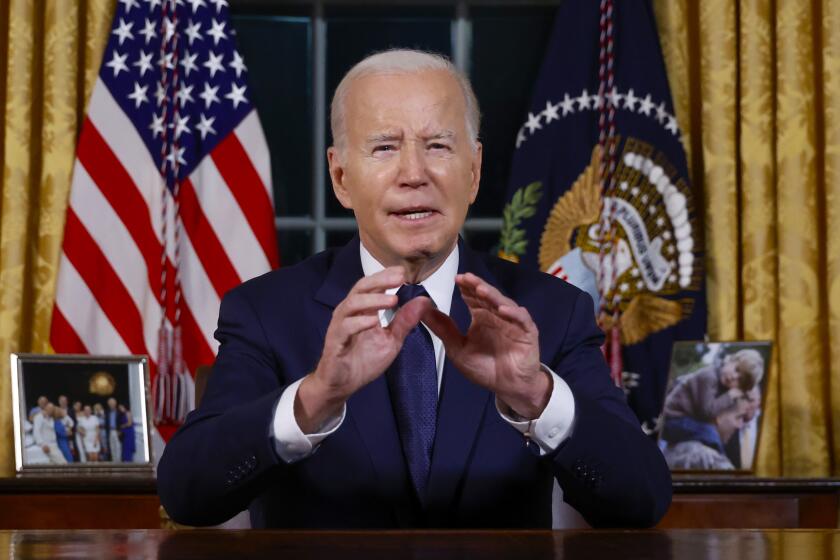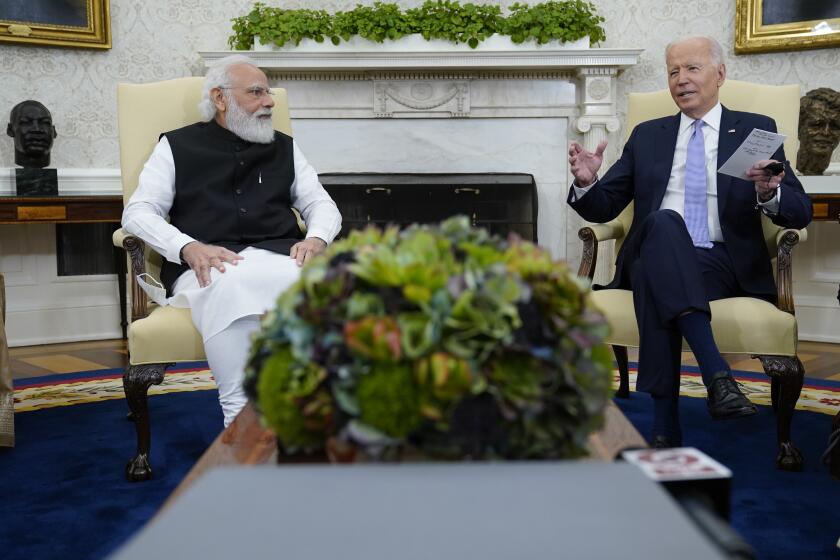Opinion: 2024 will be the biggest voting year in world history. Can democracy survive it?

- Share via
2024 will be the biggest voting year in history. Some 4.2 billion people, or more than half of humanity, live in the 76 countries that are scheduled to hold elections.
Can democracy survive it?
That question may sound cynical. But, in the 21st century, romantic ideas of democracy are dying. The latest global reports show democracy contracting across every region of the world. Polling shows widespread disillusionment in democracy, especially among young people.
In this context, elections rarely serve to renew faith in democracy. Elections produce too little positive change, inspiring frustration. They are used by authoritarian rulers to consolidate power. They divide societies or inspire violence.
When a U.S. election turns on foreign policy, the incumbent usually does well. The 2024 presidential race could turn that on its head.
Elections can also make democracies vulnerable to outside attack. That’s perhaps most apparent in Taiwan, site of the second of the national elections planned for 2024, on Jan. 13.
When I visited Taiwan this month, Vincent Chao, an official of the ruling Democratic Progressive Party, told me that the election itself was a form of national security against China, which has pledged to return the island nation to its control, by force if necessary. “Democracy is our best defense,” Chao said.
But democracy also makes Taiwan vulnerable. The Chinese government and its proxies exploit the island’s open politics to spread misinformation and raise doubts about democracy itself. Chinese influence operations reach every neighborhood; many of Taiwan’s borough wardens — essentially, elected neighborhood presidents — have received Chinese financial support, mostly via free trips to the mainland.
Republicans live in an alternate foreign policy world in which Mexico is far more pressing than Ukraine. The Democrat should adopt some of their intense interest in our own hemisphere.
Despite this, Taiwan’s election is freer and fairer than most. The first election of 2024, in Bangladesh on Jan. 7, will merely cement existing rule; the main opposition party, citing threats to its members, is refusing to contest the election. Pakistan’s Feb. 8 election is likely only to add to conflict involving the country’s most popular politician, former premier Imran Khan, and the powerful military.
On Feb. 14, Indonesia will host the world’s largest single-day election, with more than 250,000 candidates competing for 20,000 offices at all political levels. The country’s termed-out president, Joko Widodo, after weakening local democracy and a national anti-corruption commission, is using state power to back a successor, Prabowo Subianto, who has a record of human rights abuses.
On March 17, the world will see a demonstration of the vast difference between elections and actual democracy. That day Russia and Ukraine are both scheduled to hold elections. But it’s likely that only Russia’s unfree and unfair voting will go forward. Ukraine’s democratic election, meanwhile, may be postponed to protect its voters from being killed by Russian bombs on their way to the polls.
In the spring, some crucial elections could reveal whether oppositions can reverse democratic decline. In Iran, the ruling mullahs are disqualifying thousands of candidates in March 1 parliamentary elections.
Indian prime minister Modi will visit the White House this week. His government has cracked down on free speech and opponents. Democratic leaders can’t afford to let this continue.
South Africa’s general elections, which could take place as early as May, could allow the opposition alliance to take power from the party that has ruled the country since apartheid ended 30 years ago. But a change in power is full of risks. Would the opposition coalition improve democracy, end corruption and save faltering public services such as electricity or water? Or would the opposition itself govern in a more authoritarian way?
Growing authoritarianism also provides the backdrop for the world’s largest election, India’s monthlong voting in April and May. Prime Minister Narendra Modi, a Hindu nationalist, is a heavy favorite to win a third five-year term. But his increasingly autocratic behavior includes limiting the power of regions, punishing critics and journalists, and a military and digital crackdown in Kashmir.
The world’s second biggest election will come in the European Union, where some 400 million voters across 27 countries will elect the European Parliament in June. But far-right, anti-migrant parties hostile to democracy will likely make significant gains.
Across many countries holding elections this year, there are serious questions about the administration of polling. Nowhere are such questions bigger than in Mexico, where Andrés Manuel López Obrador and his ruling party, Morena, stripped the independent national election institute, or INE, of much of the local staff and money necessary to ensure election integrity in the June 2 national vote.
The fall includes elections in two large countries where previous votes saw attacks on the seat of government. Brazil holds nationwide municipal elections in October, its first votes since President Jair Bolsonaro’s supporters sought to overturn his 2022 defeat.
Then there’s the U.S. presidential election in November. Former President Trump still claims, falsely, to have won the 2020 election and says he will pardon many of those convicted of federal crimes in the 2021 insurrection. Nevertheless, he is leading in the polls, and pledging to prosecute opponents and bring “dictatorship” if he regains the world’s most powerful presidency.
By year’s end, earthlings may feel as though they’ve lived through one long global election. After seeing all the ugliness of electoral democracy, they may start wondering if there is a better way.
If they do, they might look to the growing global movement to establish governing assemblies of everyday people, chosen by lottery, as alternatives to bodies of elected officials.
They might also start rethinking the nation-state itself. Nation-states seem simultaneously too small to address planetary challenges such as climate change, pandemics and war and too big to meet the needs of local communities.
With so many people, particularly the young, losing trust in government and elections, 2024 may inspire greater interest in new democratic tools that empower citizens to better govern local communities and tackle global challenges.
Joe Mathews is democracy editor and California columnist at Zócalo Public Square, and founder of the new global publication Democracy Local. This article was produced in partnership with Zócalo Public Square.
More to Read
A cure for the common opinion
Get thought-provoking perspectives with our weekly newsletter.
You may occasionally receive promotional content from the Los Angeles Times.













